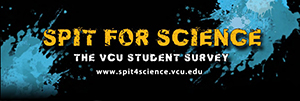Working Groups
Spit for Science fosters interdisciplinary and cross-campus collaborations by connecting collaborators with our working groups. These groups span a variety of research topics and are comprised of researchers with similar interests, to help facilitate data utilization and networking opportunities. Current Spit for Science working groups are listed below and there is always room for more to develop. For more information about how to contact our working group chairs go here.
In addition to the stress that accompanies important developmental milestones for emerging adults (i.e., leaving home, establishing financial independence, navigating peer and romantic relationships, and developing an adult identity), LGBTQIA college students face stressors related to their LGBTQIA identity, such as coming out, transitioning gender identities, encountering non-affirming and/or hostile campus and work environments, and experiencing lack of access to inclusive health and mental health services. Our goals are to examine the role of protective factors in increasing positive outcomes for LGBTQIA college students and the potential moderating influences of social support and belongingness on the relationships between stressors (i.e., social isolation, discrimination, and family-related stress), flourishing, and social, academic, and mental health outcomes.
Our working group is multidisciplinary, comprised of VCU faculty and students and external collaborators in psychology, social work, education, kinesiology, sports management, and behavioral genetics. We are are conducting cross-sectional and longitudinal studies that examine social determinants of health (e.g., discrimination, social and systemic inequalities, COVID-19 pandemic) and cultural assets (e.g., racial-ethnic identity, civic engagement, etc.) on academic outcomes and minority mental health, including alcohol, tobacco, and other substance use.
Emerging adulthood represents a time of significant change in health behaviors as youth transition from high school to the responsibilities of adulthood and, for some, college. The Health Behaviors Working Group aims to advance knowledge of engagement in and the impact of health behaviors (e.g., eating patterns, sleep, exercise, sexual practices, healthcare engagement, etc.) on psychosocial well-being during college. Our group is further interested in understanding the social determinants of health behaviors in college students.
Our group aims to facilitate the use of S4S genetic data via documented data and file structure organization, recommendations for best practices for common genomic analyses, and facilitate ongoing updates related to the genetic data towards inclusive use of the genetic data (e.g., using trans-ancestral analytic methods) and reproducibility of results. Our efforts will include documentation via READMEs, scripts, and GitHub repositories. Major projects will include: (1) organized file structures, (2) updates to imputation, ancestry informative principal component covariates, and ancestry assignments, and (3) best practices for genomic analyses including genome-wide association studies, polygenic risk scoring (PRS), genetic architecture (heritability, genetic correlation), and PRS by environment studies. Additional statistical genetic workflows will be included based on advancements in the field and user need (e.g., Mendelian randomization, genomic structural equation modeling).
Our group seeks to examine substance use in college students during emerging adulthood, a time of increased risk for problematic substance use and associated outcomes. Our working group examines alcohol and illicit substances, as well as motives and expectancies, across the spectrum of use disorder and recovery. Our work focuses on group-based differences and longitudinal/trajectory models of substance use constructs as both outcomes and predictors of other psychosocial and mental health outcomes.
The ‘Smoking’ subgroup grew out of the ‘Genetics, Epidemiology, Methods & Smoking’ lab, in short gemS. This group includes VCU faculty, trainees and external collaborators, all of us with an interest in exploring the role of genes and environment in the stages of smoking behavior from initiation to dependence and cessation. We use a variety of genetic epidemiologic approaches to investigate why people start smoking and continue to smoke, and to identify risk and protective factors that predict trajectories of smoking and related outcomes.
Traumatic stress is a transdiagnostic risk factor for the development and maintenance of psychiatric and substance use problems. Emerging adulthood is a particularly high risk developmental period wherein the prevalence of exposure to traumatic events, both interpersonal and accidental in nature, is high. Our working group examines the impact of exposure to stressors and traumatic events in relationship to psychiatric and substance use outcomes across college. We are also interested in examining sex/gender differences, potentially modifiable moderators, and interplay with genetic risk.
Resources Core
Spit for Science ensures our collaborators have resources available so they can fully utilize the data in our registry. In keeping with this goal, we have experts available to consult in several areas listed below.
- Data use consultant
- Statistical modeling consultation
- Genetics data use consultant
Dr. Kaitlin Bountress is the Data Science Consultant for S4S and provides consultation and analytic support for those working with the S4S dataset, using approaches including but not limited to structural equation modeling, latent growth curve modeling, mediation analyses, and latent class/profile analyses. Please contact her with questions at Kaitlin.Bountress@vcuhealth.org
